The Global Economy: Examining IMF's Role in Neoliberal Policies
VerifiedAdded on 2022/09/22
|7
|1381
|37
Essay
AI Summary
This essay delves into the role of the International Monetary Fund (IMF) in the global economy, examining its historical development and its association with neoliberalism. It discusses the IMF's primary goals, including promoting international trade and financial stability, while also critiquing its policies. The essay explores the concept of neoliberalism, highlighting its emphasis on free market capitalism, deregulation, and privatization, and how the IMF's policies are often aligned with this agenda. It analyzes the impact of these policies on various countries, including the United States, the United Kingdom, and several Latin American nations, using case studies to illustrate the consequences of IMF-led interventions. The essay considers the effects of neoliberal policies on economic growth, income inequality, and the role of public versus private sectors, drawing on research and reports to support its arguments and ultimately assessing the IMF's influence on global financial crises and economic structures.
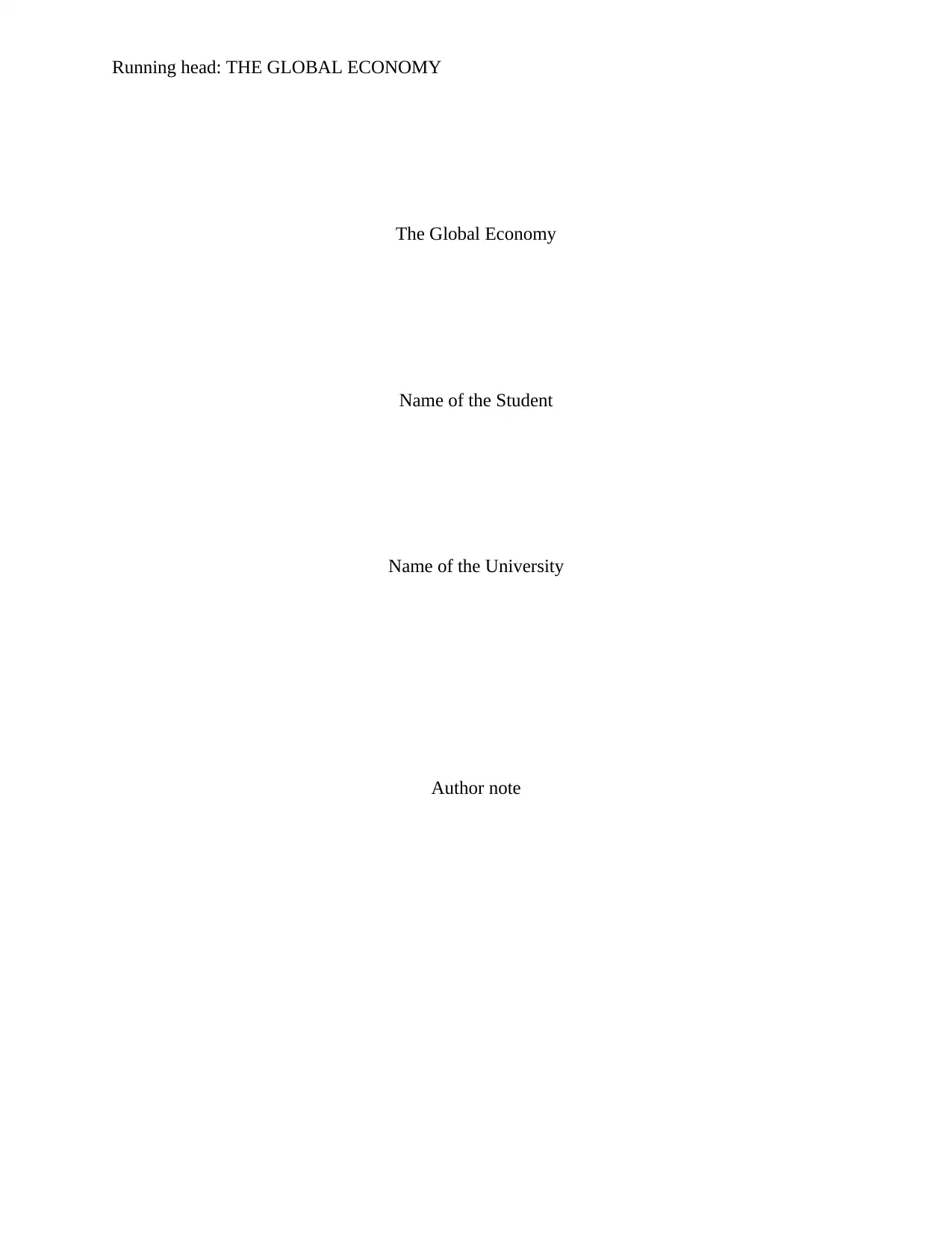
Running head: THE GLOBAL ECONOMY
The Global Economy
Name of the Student
Name of the University
Author note
The Global Economy
Name of the Student
Name of the University
Author note
Paraphrase This Document
Need a fresh take? Get an instant paraphrase of this document with our AI Paraphraser
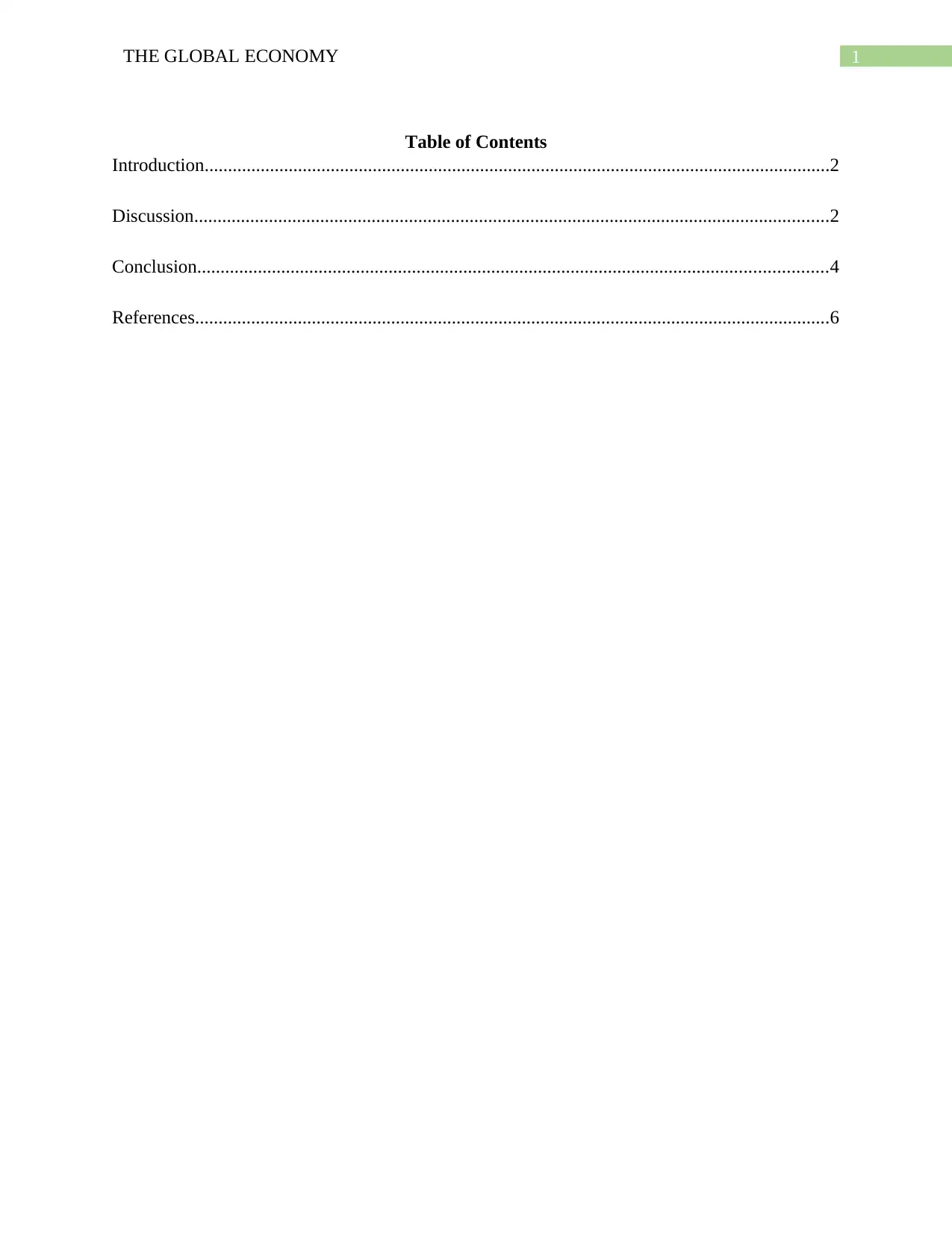
1THE GLOBAL ECONOMY
Table of Contents
Introduction......................................................................................................................................2
Discussion........................................................................................................................................2
Conclusion.......................................................................................................................................4
References........................................................................................................................................6
Table of Contents
Introduction......................................................................................................................................2
Discussion........................................................................................................................................2
Conclusion.......................................................................................................................................4
References........................................................................................................................................6
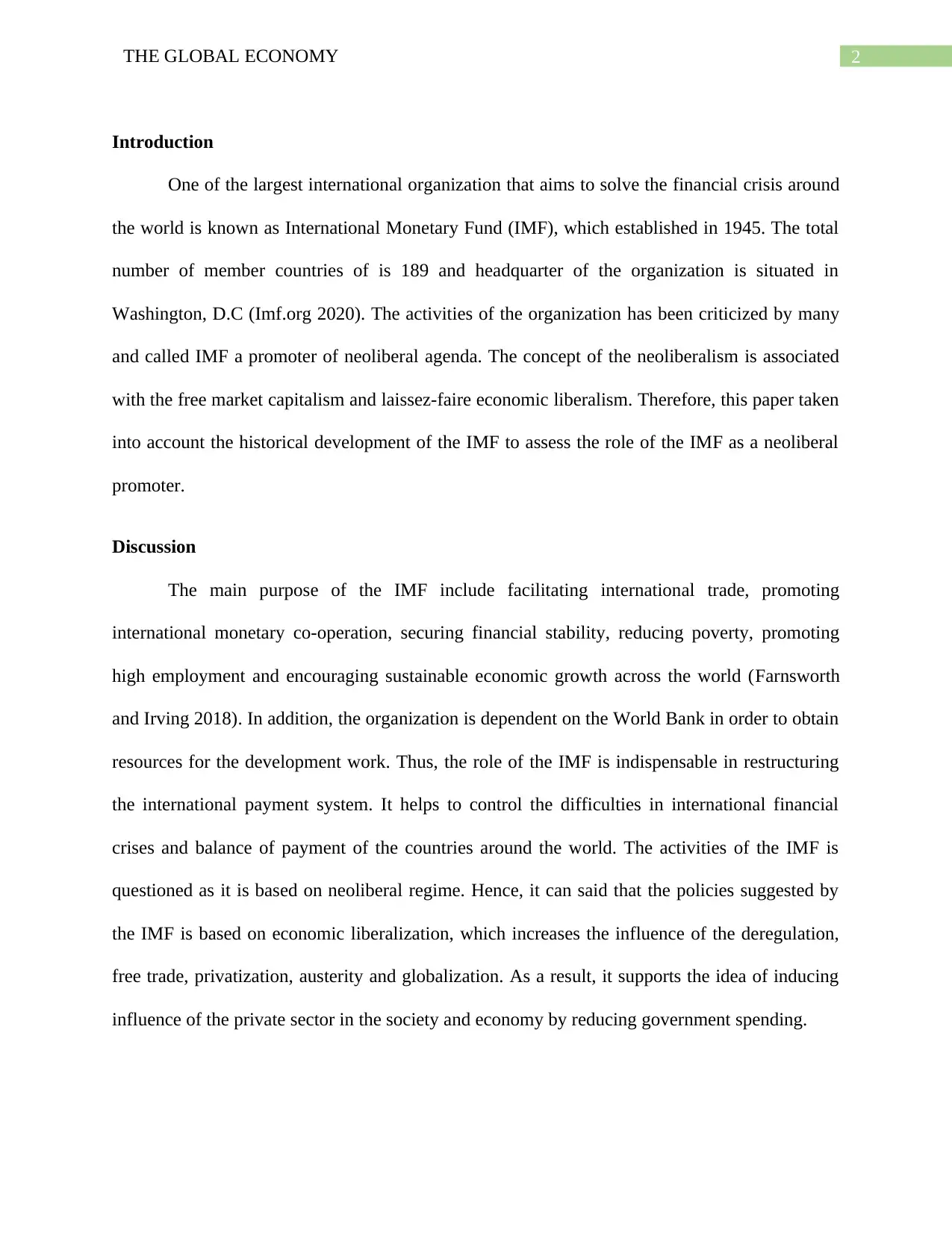
2THE GLOBAL ECONOMY
Introduction
One of the largest international organization that aims to solve the financial crisis around
the world is known as International Monetary Fund (IMF), which established in 1945. The total
number of member countries of is 189 and headquarter of the organization is situated in
Washington, D.C (Imf.org 2020). The activities of the organization has been criticized by many
and called IMF a promoter of neoliberal agenda. The concept of the neoliberalism is associated
with the free market capitalism and laissez-faire economic liberalism. Therefore, this paper taken
into account the historical development of the IMF to assess the role of the IMF as a neoliberal
promoter.
Discussion
The main purpose of the IMF include facilitating international trade, promoting
international monetary co-operation, securing financial stability, reducing poverty, promoting
high employment and encouraging sustainable economic growth across the world (Farnsworth
and Irving 2018). In addition, the organization is dependent on the World Bank in order to obtain
resources for the development work. Thus, the role of the IMF is indispensable in restructuring
the international payment system. It helps to control the difficulties in international financial
crises and balance of payment of the countries around the world. The activities of the IMF is
questioned as it is based on neoliberal regime. Hence, it can said that the policies suggested by
the IMF is based on economic liberalization, which increases the influence of the deregulation,
free trade, privatization, austerity and globalization. As a result, it supports the idea of inducing
influence of the private sector in the society and economy by reducing government spending.
Introduction
One of the largest international organization that aims to solve the financial crisis around
the world is known as International Monetary Fund (IMF), which established in 1945. The total
number of member countries of is 189 and headquarter of the organization is situated in
Washington, D.C (Imf.org 2020). The activities of the organization has been criticized by many
and called IMF a promoter of neoliberal agenda. The concept of the neoliberalism is associated
with the free market capitalism and laissez-faire economic liberalism. Therefore, this paper taken
into account the historical development of the IMF to assess the role of the IMF as a neoliberal
promoter.
Discussion
The main purpose of the IMF include facilitating international trade, promoting
international monetary co-operation, securing financial stability, reducing poverty, promoting
high employment and encouraging sustainable economic growth across the world (Farnsworth
and Irving 2018). In addition, the organization is dependent on the World Bank in order to obtain
resources for the development work. Thus, the role of the IMF is indispensable in restructuring
the international payment system. It helps to control the difficulties in international financial
crises and balance of payment of the countries around the world. The activities of the IMF is
questioned as it is based on neoliberal regime. Hence, it can said that the policies suggested by
the IMF is based on economic liberalization, which increases the influence of the deregulation,
free trade, privatization, austerity and globalization. As a result, it supports the idea of inducing
influence of the private sector in the society and economy by reducing government spending.
⊘ This is a preview!⊘
Do you want full access?
Subscribe today to unlock all pages.

Trusted by 1+ million students worldwide
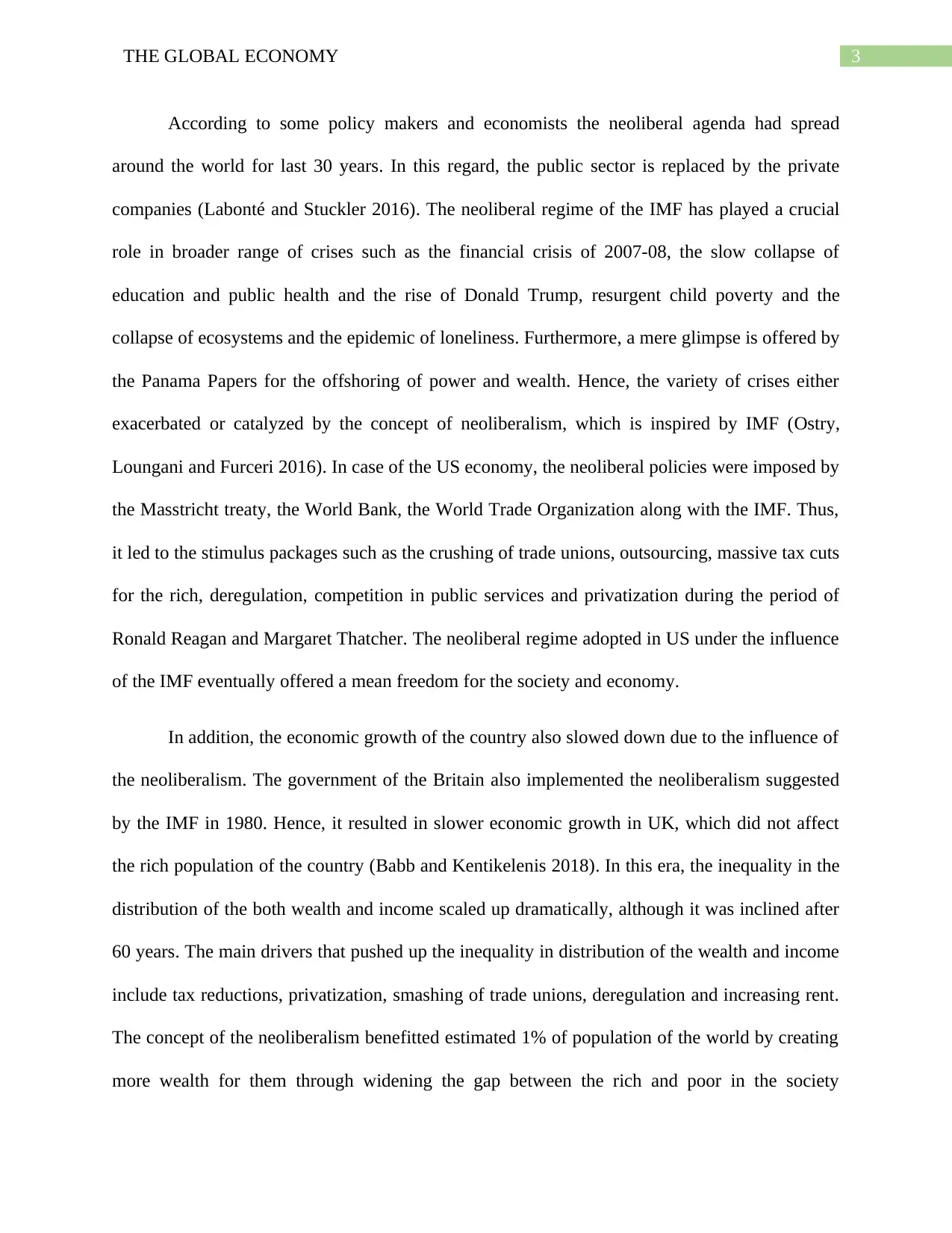
3THE GLOBAL ECONOMY
According to some policy makers and economists the neoliberal agenda had spread
around the world for last 30 years. In this regard, the public sector is replaced by the private
companies (Labonté and Stuckler 2016). The neoliberal regime of the IMF has played a crucial
role in broader range of crises such as the financial crisis of 2007-08, the slow collapse of
education and public health and the rise of Donald Trump, resurgent child poverty and the
collapse of ecosystems and the epidemic of loneliness. Furthermore, a mere glimpse is offered by
the Panama Papers for the offshoring of power and wealth. Hence, the variety of crises either
exacerbated or catalyzed by the concept of neoliberalism, which is inspired by IMF (Ostry,
Loungani and Furceri 2016). In case of the US economy, the neoliberal policies were imposed by
the Masstricht treaty, the World Bank, the World Trade Organization along with the IMF. Thus,
it led to the stimulus packages such as the crushing of trade unions, outsourcing, massive tax cuts
for the rich, deregulation, competition in public services and privatization during the period of
Ronald Reagan and Margaret Thatcher. The neoliberal regime adopted in US under the influence
of the IMF eventually offered a mean freedom for the society and economy.
In addition, the economic growth of the country also slowed down due to the influence of
the neoliberalism. The government of the Britain also implemented the neoliberalism suggested
by the IMF in 1980. Hence, it resulted in slower economic growth in UK, which did not affect
the rich population of the country (Babb and Kentikelenis 2018). In this era, the inequality in the
distribution of the both wealth and income scaled up dramatically, although it was inclined after
60 years. The main drivers that pushed up the inequality in distribution of the wealth and income
include tax reductions, privatization, smashing of trade unions, deregulation and increasing rent.
The concept of the neoliberalism benefitted estimated 1% of population of the world by creating
more wealth for them through widening the gap between the rich and poor in the society
According to some policy makers and economists the neoliberal agenda had spread
around the world for last 30 years. In this regard, the public sector is replaced by the private
companies (Labonté and Stuckler 2016). The neoliberal regime of the IMF has played a crucial
role in broader range of crises such as the financial crisis of 2007-08, the slow collapse of
education and public health and the rise of Donald Trump, resurgent child poverty and the
collapse of ecosystems and the epidemic of loneliness. Furthermore, a mere glimpse is offered by
the Panama Papers for the offshoring of power and wealth. Hence, the variety of crises either
exacerbated or catalyzed by the concept of neoliberalism, which is inspired by IMF (Ostry,
Loungani and Furceri 2016). In case of the US economy, the neoliberal policies were imposed by
the Masstricht treaty, the World Bank, the World Trade Organization along with the IMF. Thus,
it led to the stimulus packages such as the crushing of trade unions, outsourcing, massive tax cuts
for the rich, deregulation, competition in public services and privatization during the period of
Ronald Reagan and Margaret Thatcher. The neoliberal regime adopted in US under the influence
of the IMF eventually offered a mean freedom for the society and economy.
In addition, the economic growth of the country also slowed down due to the influence of
the neoliberalism. The government of the Britain also implemented the neoliberalism suggested
by the IMF in 1980. Hence, it resulted in slower economic growth in UK, which did not affect
the rich population of the country (Babb and Kentikelenis 2018). In this era, the inequality in the
distribution of the both wealth and income scaled up dramatically, although it was inclined after
60 years. The main drivers that pushed up the inequality in distribution of the wealth and income
include tax reductions, privatization, smashing of trade unions, deregulation and increasing rent.
The concept of the neoliberalism benefitted estimated 1% of population of the world by creating
more wealth for them through widening the gap between the rich and poor in the society
Paraphrase This Document
Need a fresh take? Get an instant paraphrase of this document with our AI Paraphraser
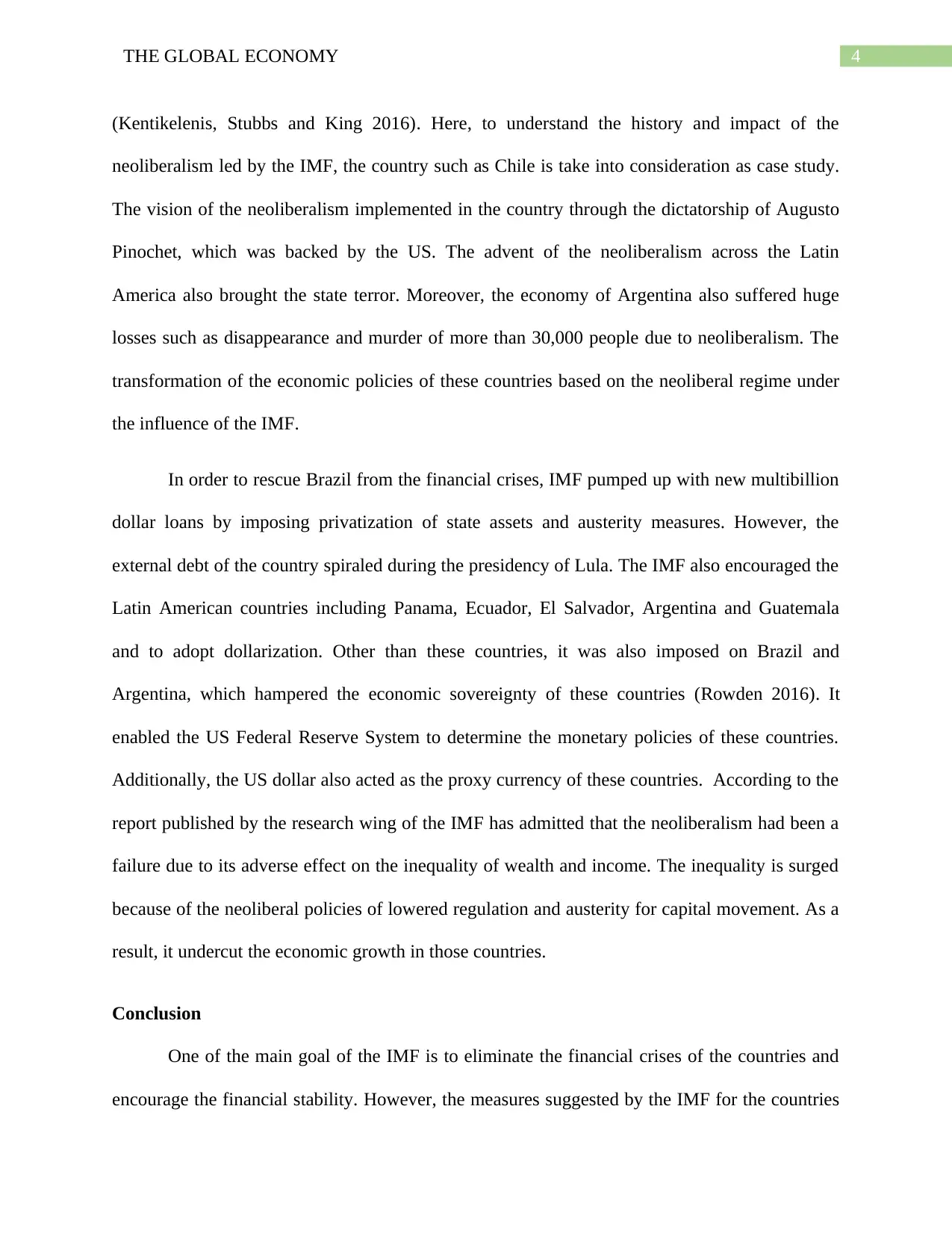
4THE GLOBAL ECONOMY
(Kentikelenis, Stubbs and King 2016). Here, to understand the history and impact of the
neoliberalism led by the IMF, the country such as Chile is take into consideration as case study.
The vision of the neoliberalism implemented in the country through the dictatorship of Augusto
Pinochet, which was backed by the US. The advent of the neoliberalism across the Latin
America also brought the state terror. Moreover, the economy of Argentina also suffered huge
losses such as disappearance and murder of more than 30,000 people due to neoliberalism. The
transformation of the economic policies of these countries based on the neoliberal regime under
the influence of the IMF.
In order to rescue Brazil from the financial crises, IMF pumped up with new multibillion
dollar loans by imposing privatization of state assets and austerity measures. However, the
external debt of the country spiraled during the presidency of Lula. The IMF also encouraged the
Latin American countries including Panama, Ecuador, El Salvador, Argentina and Guatemala
and to adopt dollarization. Other than these countries, it was also imposed on Brazil and
Argentina, which hampered the economic sovereignty of these countries (Rowden 2016). It
enabled the US Federal Reserve System to determine the monetary policies of these countries.
Additionally, the US dollar also acted as the proxy currency of these countries. According to the
report published by the research wing of the IMF has admitted that the neoliberalism had been a
failure due to its adverse effect on the inequality of wealth and income. The inequality is surged
because of the neoliberal policies of lowered regulation and austerity for capital movement. As a
result, it undercut the economic growth in those countries.
Conclusion
One of the main goal of the IMF is to eliminate the financial crises of the countries and
encourage the financial stability. However, the measures suggested by the IMF for the countries
(Kentikelenis, Stubbs and King 2016). Here, to understand the history and impact of the
neoliberalism led by the IMF, the country such as Chile is take into consideration as case study.
The vision of the neoliberalism implemented in the country through the dictatorship of Augusto
Pinochet, which was backed by the US. The advent of the neoliberalism across the Latin
America also brought the state terror. Moreover, the economy of Argentina also suffered huge
losses such as disappearance and murder of more than 30,000 people due to neoliberalism. The
transformation of the economic policies of these countries based on the neoliberal regime under
the influence of the IMF.
In order to rescue Brazil from the financial crises, IMF pumped up with new multibillion
dollar loans by imposing privatization of state assets and austerity measures. However, the
external debt of the country spiraled during the presidency of Lula. The IMF also encouraged the
Latin American countries including Panama, Ecuador, El Salvador, Argentina and Guatemala
and to adopt dollarization. Other than these countries, it was also imposed on Brazil and
Argentina, which hampered the economic sovereignty of these countries (Rowden 2016). It
enabled the US Federal Reserve System to determine the monetary policies of these countries.
Additionally, the US dollar also acted as the proxy currency of these countries. According to the
report published by the research wing of the IMF has admitted that the neoliberalism had been a
failure due to its adverse effect on the inequality of wealth and income. The inequality is surged
because of the neoliberal policies of lowered regulation and austerity for capital movement. As a
result, it undercut the economic growth in those countries.
Conclusion
One of the main goal of the IMF is to eliminate the financial crises of the countries and
encourage the financial stability. However, the measures suggested by the IMF for the countries
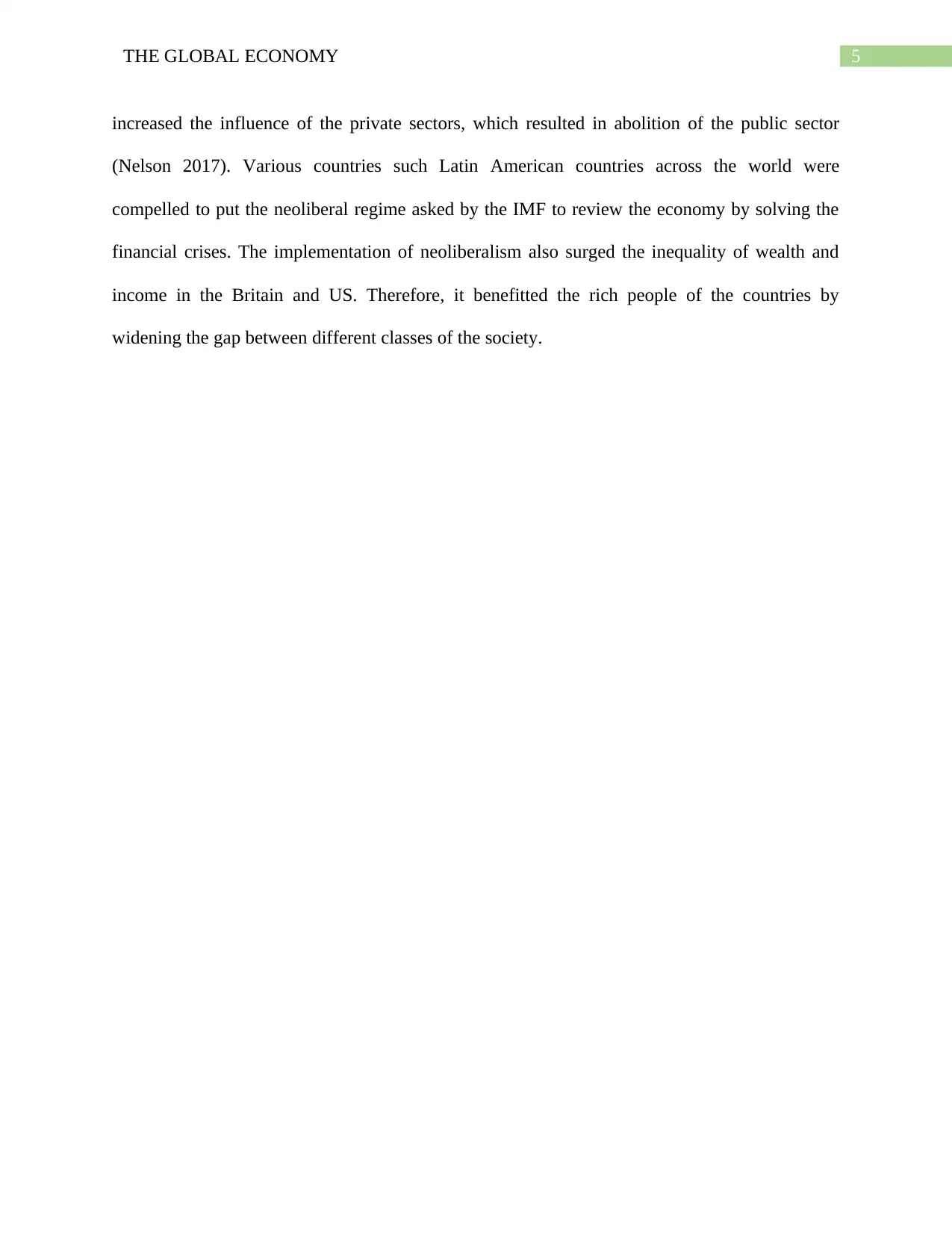
5THE GLOBAL ECONOMY
increased the influence of the private sectors, which resulted in abolition of the public sector
(Nelson 2017). Various countries such Latin American countries across the world were
compelled to put the neoliberal regime asked by the IMF to review the economy by solving the
financial crises. The implementation of neoliberalism also surged the inequality of wealth and
income in the Britain and US. Therefore, it benefitted the rich people of the countries by
widening the gap between different classes of the society.
increased the influence of the private sectors, which resulted in abolition of the public sector
(Nelson 2017). Various countries such Latin American countries across the world were
compelled to put the neoliberal regime asked by the IMF to review the economy by solving the
financial crises. The implementation of neoliberalism also surged the inequality of wealth and
income in the Britain and US. Therefore, it benefitted the rich people of the countries by
widening the gap between different classes of the society.
⊘ This is a preview!⊘
Do you want full access?
Subscribe today to unlock all pages.

Trusted by 1+ million students worldwide
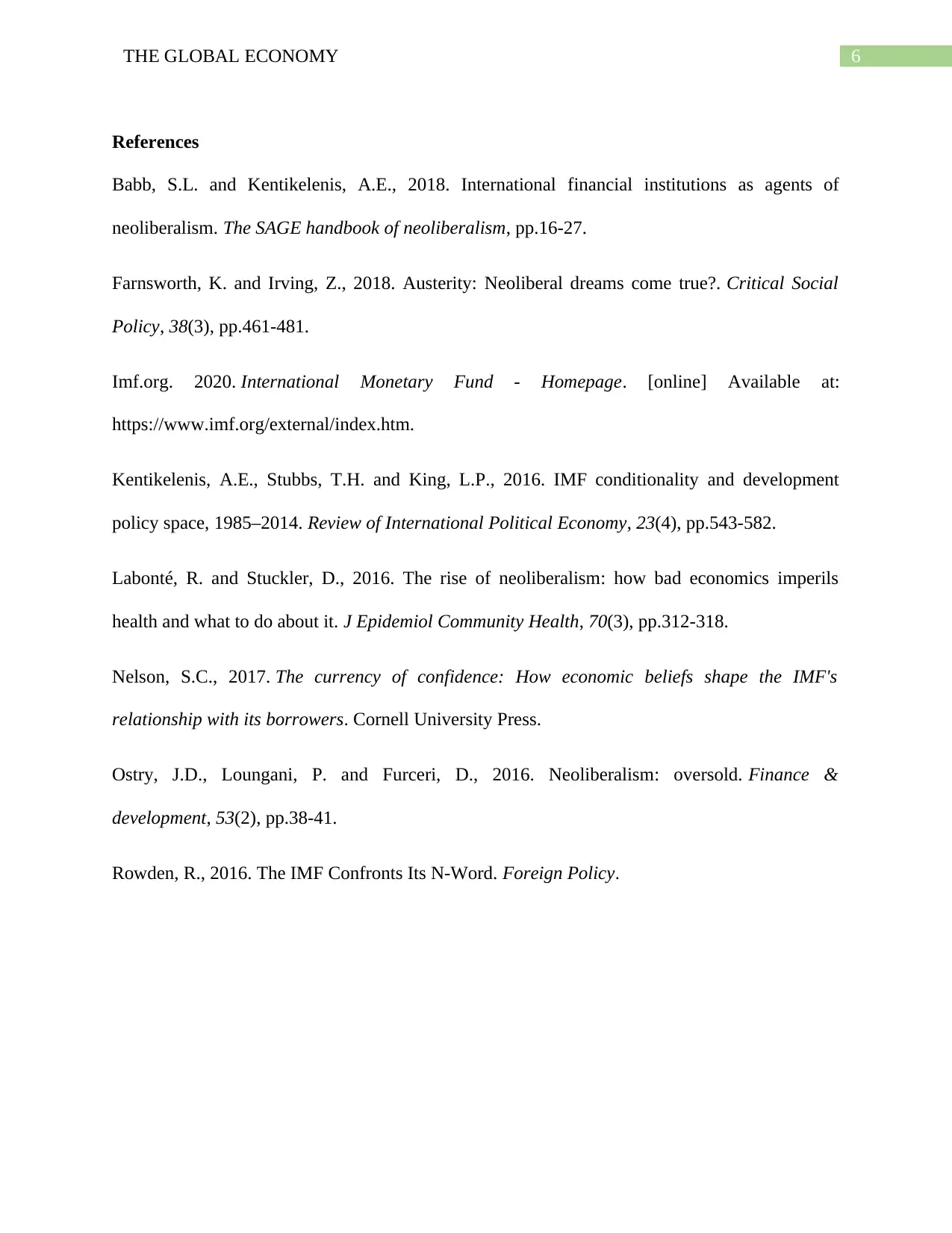
6THE GLOBAL ECONOMY
References
Babb, S.L. and Kentikelenis, A.E., 2018. International financial institutions as agents of
neoliberalism. The SAGE handbook of neoliberalism, pp.16-27.
Farnsworth, K. and Irving, Z., 2018. Austerity: Neoliberal dreams come true?. Critical Social
Policy, 38(3), pp.461-481.
Imf.org. 2020. International Monetary Fund - Homepage. [online] Available at:
https://www.imf.org/external/index.htm.
Kentikelenis, A.E., Stubbs, T.H. and King, L.P., 2016. IMF conditionality and development
policy space, 1985–2014. Review of International Political Economy, 23(4), pp.543-582.
Labonté, R. and Stuckler, D., 2016. The rise of neoliberalism: how bad economics imperils
health and what to do about it. J Epidemiol Community Health, 70(3), pp.312-318.
Nelson, S.C., 2017. The currency of confidence: How economic beliefs shape the IMF's
relationship with its borrowers. Cornell University Press.
Ostry, J.D., Loungani, P. and Furceri, D., 2016. Neoliberalism: oversold. Finance &
development, 53(2), pp.38-41.
Rowden, R., 2016. The IMF Confronts Its N-Word. Foreign Policy.
References
Babb, S.L. and Kentikelenis, A.E., 2018. International financial institutions as agents of
neoliberalism. The SAGE handbook of neoliberalism, pp.16-27.
Farnsworth, K. and Irving, Z., 2018. Austerity: Neoliberal dreams come true?. Critical Social
Policy, 38(3), pp.461-481.
Imf.org. 2020. International Monetary Fund - Homepage. [online] Available at:
https://www.imf.org/external/index.htm.
Kentikelenis, A.E., Stubbs, T.H. and King, L.P., 2016. IMF conditionality and development
policy space, 1985–2014. Review of International Political Economy, 23(4), pp.543-582.
Labonté, R. and Stuckler, D., 2016. The rise of neoliberalism: how bad economics imperils
health and what to do about it. J Epidemiol Community Health, 70(3), pp.312-318.
Nelson, S.C., 2017. The currency of confidence: How economic beliefs shape the IMF's
relationship with its borrowers. Cornell University Press.
Ostry, J.D., Loungani, P. and Furceri, D., 2016. Neoliberalism: oversold. Finance &
development, 53(2), pp.38-41.
Rowden, R., 2016. The IMF Confronts Its N-Word. Foreign Policy.
1 out of 7
Related Documents
Your All-in-One AI-Powered Toolkit for Academic Success.
+13062052269
info@desklib.com
Available 24*7 on WhatsApp / Email
![[object Object]](/_next/static/media/star-bottom.7253800d.svg)
Unlock your academic potential
Copyright © 2020–2026 A2Z Services. All Rights Reserved. Developed and managed by ZUCOL.





